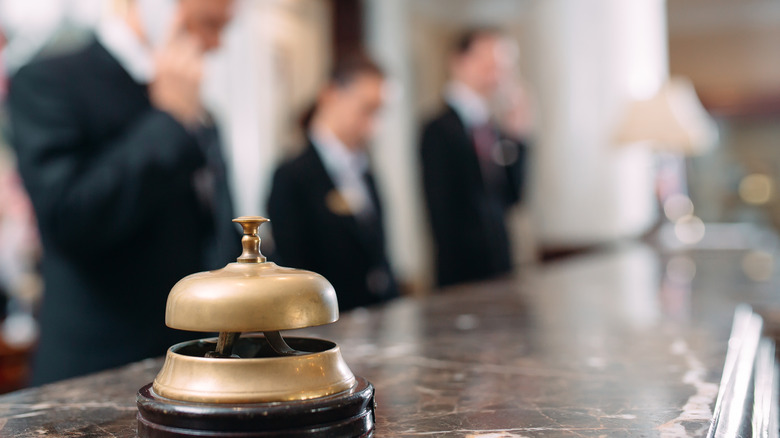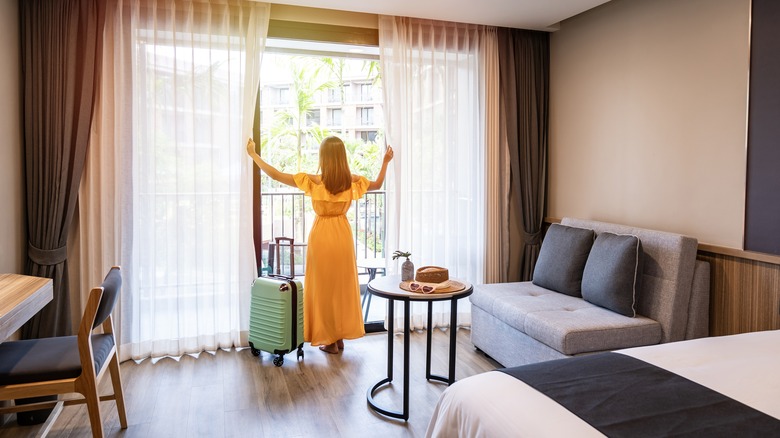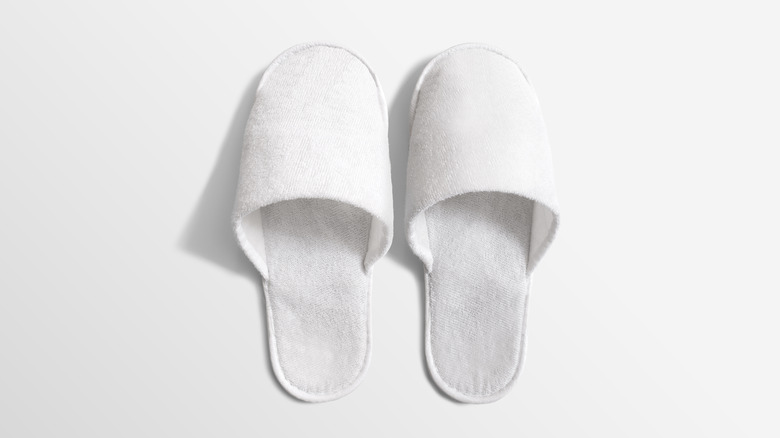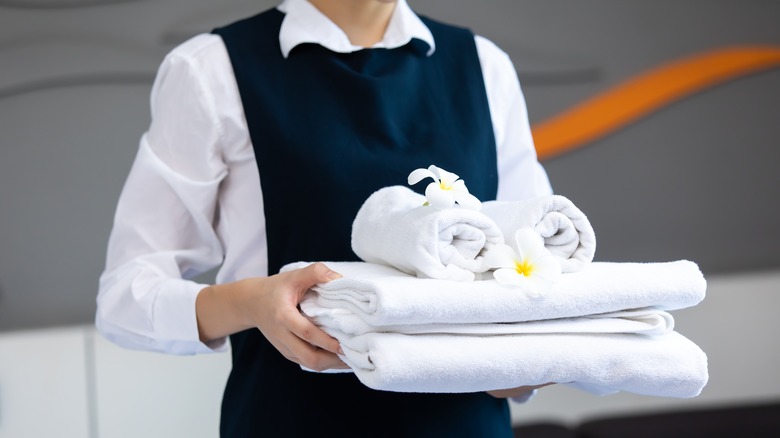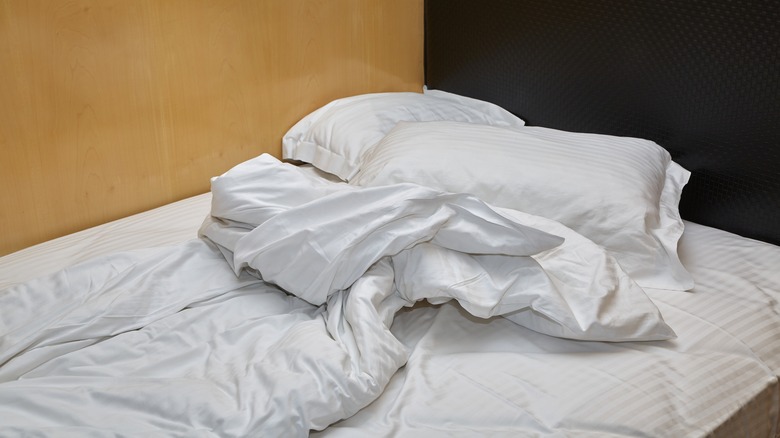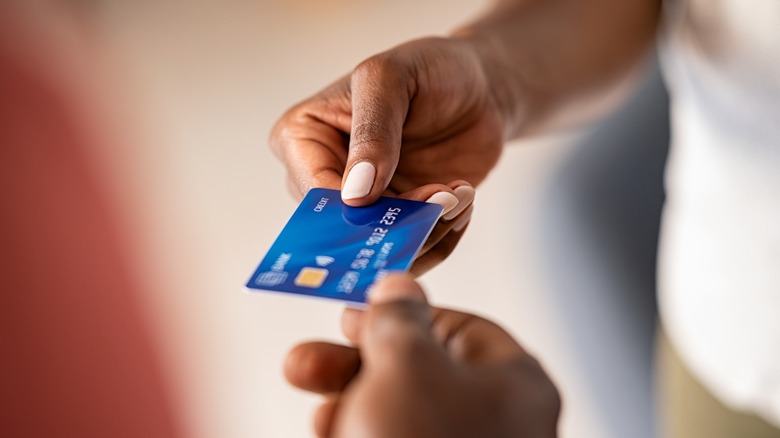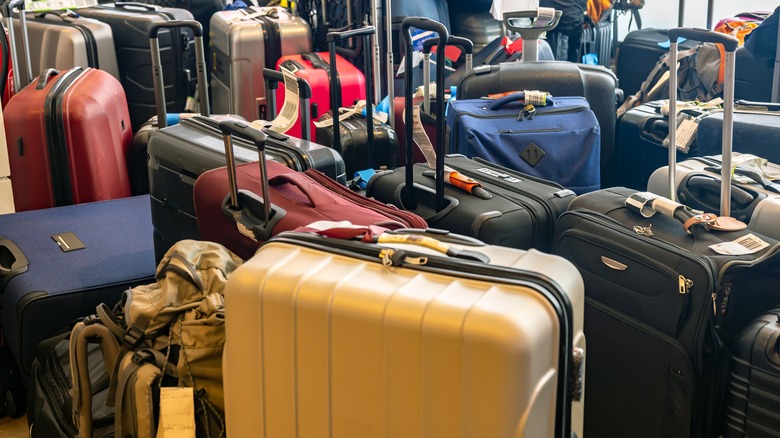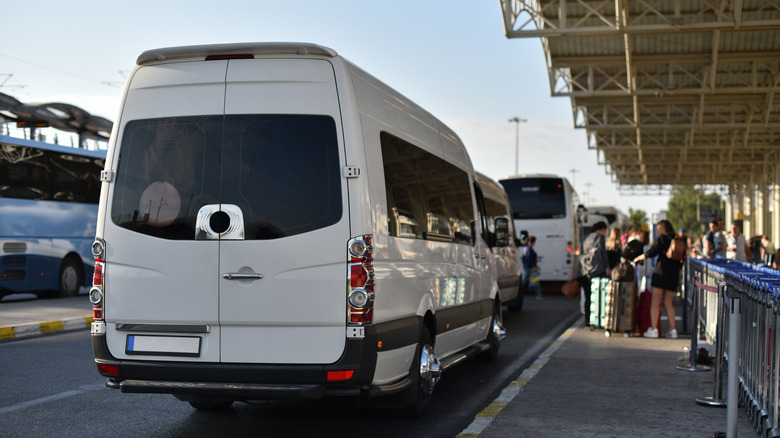19 Mistakes To Avoid When Checking Out Of A Hotel
A hotel is a home away from home, and the staff, service, facilities, and amenities there are designed to make guests feel comfortable, cared for, and content. Unlike a home, though, once you've left, your relationship with the property essentially ends, you can't easily drift in and out of the place like you would with your own abode. It's important that when you check out of a hotel that you make a clean break, winding up all your business, all your outstanding issues, and all your charges before you drive, or walk, away from the property.
That may seem like obvious advice, but a number of easily made mistakes can quickly turn a great stay at an enjoyable hotel into a disastrous finale that will linger long after you've left. Follow these simple pointers to ensure that the end of your next stay, wherever that may be, isn't derailed by unexpected pitfalls.
1. Not getting a wake-up call
We all recall that dreaded feeling of having to get up early to check out of a hotel, either to catch a flight or to hit the road before the roads get choked with traffic. Many of us use our phones as an alarm, but for extra security, get the front desk to give you a wake-up call and a follow-up reminder five minutes later. These wake-up calls can be manual, made by someone who actually sits at the front desk or another part of the property, or the wake-up calls can be set up via an automated system at the hotel.
Both methods are usually reliable (the latter, generally more, because there is less room for human error, except for the guest punching in the wrong time for the call!), and these calls are a great backup in addition to the phone alarm. It's especially important when you consider the following: Who hasn't slept through their phone alarm because they are so used to the sound of it that it's no longer effective, or whose phone battery hasn't died overnight? No juice, no jingle, so opt for a wake-up call as a fail-safe.
2. Not confirming when breakfast starts
Once you have that wake-up call out of the way, the next thing to take care of is to tend to that rumbling stomach. The fact is there are few things worse than leaving a hotel with a belly that's grinding and growling for sustenance. While there is no industry standard time when hotels start to serve breakfast, a typical window might be from 7-10 a.m., though the meal could start and end earlier or later. Whatever the time, be sure to confirm it ahead of time with a simple call to the front desk.
Even if you leave before breakfast is ready for guests, the kitchen can prepare a small plate to tide you over or to take on the road. It's true that many hotels also offer 24-hour room service, so getting the timing right for the hotel breakfast might not be so crucial, but it's hard to tell exactly when room service food will arrive. What's more, getting a meal (breakfast) that is likely already included in the room rate seems like a much more sensible option.
3. Not checking out
Many people don't actually check out of the room — they just leave the hotel — and while there aren't any concrete statistics on the percentage of guests that do that, it's not a smart move. By leaving without notifying the property, you won't be able to see charges on your bill that may be incorrect or let the staff know that the room is vacant and ready to be cleaned. Checking out doesn't mean standing in a long line at the front desk. Hotels now offer guests an array of options for checking out that don't require them to do that.
With the increasing use of technology, checking out can be done via a screen, either from a kiosk in the hotel lobby (the same kiosk where guests can sometimes check-in), via a hotel interface, like the Marriott Bonvoy or World of Hyatt apps, or even on an in-room TV monitor. Guests can also make a call to the front desk to advise them of their imminent departure, or go to the front desk well before the checkout deadline (which tends to be 11 a.m. — 12 p.m.) and checkout then, though they can leave the room later. If you don't check out, a hotel can dump charges on your bill — minibar items, a room service item, and so on — and you will have to contest it after the fact over the phone or online. Wouldn't it be easier to sort it all out when you are at the property?
4. Not watching the clock
Hotel check-out times aren't arbitrary, worthless deadlines, yet sometimes guests will choose to ignore them, overstay their welcome, and yet still be shocked to be charged extra when they check out late (the charge can be a full night's fee in some places). That penalty can be easily avoided by simply following the rules, watching the time, and checking out when you should.
If you do need to check out late for any reason, you can request this from the reservations department or front desk. Hotel rooms, like most commodities, are governed by the capricious forces of supply and demand, and if a hotel is fully booked, it might not be able to accommodate your late request. However, if there are unsold rooms on the day that you are checking out — meaning nobody will be occupying your digs — then you might be allowed to stay late for no extra fee. Some hotel loyalty cards also allow late checkouts, either as a complimentary card perk or for a nominal charge.
5. Not collecting everything
The lost and found at a hotel must make for a fascinating sociological study. Check-out means you leave the room, and also your belongings, so doing a final check to ensure nothing was left behind is crucial — and this doesn't just mean a quick glance in the bathroom and on the bed. A proper survey entails getting on all fours and looking under the bed, pulling back the bed covers to see if anything got in between the sheets, and opening dresser drawers for items that you stowed away. One item that guests commonly overlook is the phone charger, so check the wall outlets or desk surfaces for chargers and adapters before leaving.
Items left in the safe — valuables, jewelry, important documents — can easily be forgotten, so we suggest that travelers either empty the safe the night before check-out and pack the items, or, if they aren't comfortable doing that, place something that they will need (car keys, a phone, etc.) in the safe so that they will have to open it before they leave. If you do end up leaving something crucial behind, call the hotel and hopefully, they will be able to locate it and ship it back to you. That said, hotels aren't necessarily liable for items missing from a safe, so if you leave something behind, and they can't find it for you, you might be out of luck.
6. Not planning properly
There's an old saying — haste makes waste — that reminds us that if you need to absolutely be somewhere specific at a certain time, don't place yourself in a mad rush and wait till the last minute to check out (possibly forgetting to scan the room for your items in the process). Travelers know of the checkout times in advance, so make a mental note of that time and work backward to see when you need to start preparing for your departure.
Do you need at least two hours in the morning to wake up, finish your beauty routine, have breakfast, and pack, or is 30 minutes sufficient to get all your affairs in order? Even with that factored in, and if you plan to check out at the front desk, remember that this might take some time as lines for check out are never easy to predict. Add 15 minutes for this into the equation (possibly longer if the hotel is very large and very busy), or use one of the other checkout options listed above for a speedier exit.
7. Not taking swag
When housekeeping comes by to clean up, there are certain items that they tend to discard after every guest vacates the room, like toiletries, and slippers. While we're not saying that travelers should become hoarders and grab all and every freebie available, it is better to (re)use these things rather than have them tossed in the trash. Hotels also factor into their bottom line that some pilfering will take place in each room, so travelers shouldn't feel guilty for snagging some swag, as long as they are reasonable in their choices.
Common things that won't be missed are bars of soap, toiletries that come in single-use containers, and in-room slippers that are usually placed on the floor of a closet (but don't take the robes hanging above them). Feel free also to take the hotel-branded pen and stationery, it's good advertising for the property after all. Rooms sometimes have fruit baskets or some food items as a welcome package, take these as well as any packets of sugar or sweeteners, but be sure not to confuse them with the goods that are in the pricey mini-bar.
8. Not leaving a tip
At every hotel, the housekeeping teams work largely in the shadows, making sure your room is crisp and clean day in, day out, and they do so when you are out of sight. But just because you don't see them doesn't mean that these tireless workers don't deserve a little monetary appreciation. Cleaning a room doesn't just require a quick flap of some sheets and a wipe down of bathroom counters, but demands an effort that is altogether more intensive.
Beds must be completely stripped, towels removed, the room vacuumed and dusted, the bathroom cleaned so that it's spotless, toilet rolls replaced, surfaces wiped down and shiny, items must be restocked, beds remade and fresh towels refolded and hung, and all traces, however minute, of any previous tenant of the rooms has to be removed. And this procedure is repeated for hundreds of rooms, every single day. Given that, is it too much to show a little thanks? The American Hotel & Lodging Association suggests an amount of $1-$5 per day, left on a daily basis rather than a lump sum at the end, in an envelope that identifies that the money is for housekeeping.
9. Not being considerate
Leaving the room a mess is just bad manners that are a symptom of irresponsible behavior, and a visible show of a lack of respect. Remember, this is your home away from home, and while you aren't expected to depart with the place looking immaculate, maintaining a semblance of general tidiness is the right thing to do. Think about what would make your life easier if you had to come in to clean up after yourself.
Perhaps consider putting all the garbage in the trash can, rather than leaving bits of food or wrappers or empty cans/bottles lying around the space. How about flushing the toilet and ensuring that there aren't trails of tissue paper strewn all over the bathroom, and maybe even clumping together all the dirty towels together in one pile? What about placing the pillows back on the bed rather than leaving them to fester on the floor? Some guests might argue that if they don't leave a mess, housekeeping wouldn't have a job, but the team has enough work to do to restore each room every day, does it really need to be given extra?
10. Lighting up in the room
While permitted smoking in a hotel room is increasingly uncommon, there are still some properties that sell smoking rooms. But's let assume that the hotel where you are staying doesn't, in which case don't flout the rules and try to secretly smoke. While cigarette smoke is unlikely to cause an allergic reaction in anyone, it definitely serves as an irritant, and for many, is a smell that is unbearable, one that seeps into fabrics and surfaces and can be hard to get out. Hotels have smoke and vape sensors in rooms where smoking is not permitted, but even if you manage to not trigger one, the odious smell in the room might be enough to tip off the staff of your nefarious activities.
A hotel can add a charge to the bill if it feels that smoking or vaping has taken place in a non-smoking room (this usually happens after you check out), and this charge usually runs in the hundreds of dollars. According to Fresh Air, which makes sensors for hotel rooms that detect cigarette and vape fumes, about 10% of non-smoking rooms are besmirched by smoking each month. Any penalty charged goes toward the extra cleaning involved in ridding the room of odors — deep washing of carpets and upholstery — and the room has to be taken out of inventory for a longer time, making the overall cost to the property of any breach significantly higher than the fine charged.
11. Not checking your bill
Check out is rarely a moment in the day when a guest is blessed with vast chunks of free time. But that lack of time is no excuse for ignoring the most important thing when you do finally leave — to pore over your bill and check each and every charge. The vast majority of times, the fees levied will be as you expected — nightly hotel rates, taxes, dining charges being the main components — but once in a while, there will be a mistake and an erroneous charge will appear.
Perhaps a drink at the hotel bar at a time when you were asleep, an extra room night added to your bill in error, a room service expense when you were eating at a restaurant at the other side of town (keep a copy of the receipt of that meal, it may prove useful when disputing the charge on your bill). These things happen, humans are humans after all, and the best time to catch them is when you are at the front desk, bill in hand, when you can go over and itemize mistakes with a live person right there.
12. Not being civil
If you are unhappy with something while reviewing your bill, don't start shouting, being rude, or talking down to the staff. That's certainly not the best way to make your case or have the front desk employees show sympathy for your complaint. Treat the people at the hotel with respect, in a calm, controlled manner, and try to be objective about anything that you think is an error, not scream like an unhinged banshee or act like a bubbling volcano on the verge of erupting with rage.
If you find yourself upset about a charge on the bill, take a deep breath, look around — you'll see that everyone around you is an adult, and is perfectly adept at handling problems in a conciliatory, adult manner — and maintain cool poise when stating your point of view. A dispute is settled much more quickly when approached with honey, rather than when it is further fueled with fire.
13. Not paying with a credit card
Hotels can usually take payment in cash, via debit, or on a credit card, and while most travelers will use the last option, it's really the only one that should be considered. For many travelers, it's also an automatic option, since a hotel booking is usually made on a credit card (a way for the hotel to guarantee you will actually show up), and at check out, the hotel staff will usually ask you if the bill should be charged to the card on record. But guests also have the option not to use that card, by paying with a different card, or will do a debit transaction.
Always go with a credit card. If there is a dispute with a charge after the fact, perhaps something that a traveler missed on the bill at the time of checkout, it's much easier to contest the charge after paying by credit card; the charge can be returned to the credit card account (not so easy if payment was made in cash), and if the dispute isn't easily settled with the hotel, guests can ask the credit card company to step in and advocate on their behalf. Cards also bring the benefits of cash-back rewards, and in the case of co-branded cards tied to a hotel, a possible added layer of points for the cardholder.
14. Not getting your points
Going further to the final point mentioned above, if you are a member of a loyalty program at a hotel, you know that points mean everything, so make sure you get yours when you check out. Hotels are usually pretty savvy about recognizing guests that are enrolled in their loyalty schemes, travelers that frequent a brand repeatedly make for good business, and might even remark on that loyalty when checking a guest out.
Travelers stick to a specific brand just to get the points, and this isn't exclusive to hotel guests, it's long been a mainstay for fliers that favor a certain airline when scoping out flights. At the time of checkout, confirm that the points for your stay have been credited to your account — this doesn't have to be just for the hotel rooms, charges at the property's restaurant are also eligible toward earning points — and have your loyalty number on hand if, for any reason, that hasn't happened.
15. Not leaving feedback
Hotels are constantly looking to improve, after all, their goal is to make their guests happy. So if there is something you think can be done better, be sure to let them know. Feedback forms, once exclusively done on paper and now increasingly compiled electronically, help a hotel to focus on and address issues that guests might have, and rectify them so that future arrivals don't encounter the same problem.
Feedback can be as general or as granular as the guest desires, anything from a request to have more or fewer pillows on the bed to advice on how to better manage the flow of guests during busy periods of the day, or even how attentive, or inattentive, the guest felt that staff were during the stay. There is no such thing as right or wrong feedback, all of it is valuable to the hotel, so if you have any, definitely speak up, knowing that your input might help to make the property an even better product down the line.
16. Not airing your dissatisfaction appropriately
That said, if you are unhappy with things that happened during your stay, don't leave it until checkout to voice your dissatisfaction, churning out a litany of moments and experiences that went wrong. By this stage, there is little that the hotel can do other than offer its deepest apologies and perhaps supply with you a discount for a future stay or some points. Wouldn't it be better to take care of any issues during the stay, especially if they are important? Maybe you noticed a strange, sharp smell in the room that you just couldn't shake, and decided to endure it, ruining your stay. Why wait until checkout when housekeeping or engineering could have remedied it earlier?
How about being stuck in a noisy room, facing the street, that doesn't let you sleep at night? Or your temperature controls didn't work and your room felt like the freezer section of a grocery store (hence you wearing thermals in bed)? If you'd said something immediately, the hotel might have moved you to a quiet, empty accommodation in the back, or sent up a technician to fix the air problem pronto, and the stay would have turned out differently.
17. Not checking your luggage
With the ubiquity of rolled luggage, most travelers will take their own bags out of the room, down the hallway, into the elevator, and with them to check out. But if you call the front desk to arrange for a bellhop to bring your luggage to the lobby, be sure to check that it gets there. A simple point, but it's an easy thing to overlook in the rush to leave on time, settle your bill, and catch a taxi or a shuttle.
An army of bags shuffle between the rooms and the lobby around the time of checkout, and it's easy for some luggage to get misplaced, left on a floor while waiting for space to be freed up in the elevator, or inadvertently handed to the wrong person (especially since so much luggage these days looks so similar). You know better than anyone what your bag looks like, so keep track of it before you leave the property.
18. Not arranging bag drop-off
Sometimes you won't be leaving the city or area where you are staying until later in the day but you still won't be able to secure a late checkout. In those situations, you need to check out on time and then ask the front desk to look after your luggage, which you will collect later. Hotels are happy to do this for people that have stayed with them and don't charge a fee for the service, but it's important to organize this ahead of time, not at the moment of checkout.
This way, the staff can make a notation that you will require this benefit, and set aside space for your bags in a secured area. If you roll up at checkout and ask for them to keep your bags for a few hours, there might not be any space available, and you might find yourself awkwardly lugging the luggage around town.
19. Not setting up your transfer in advance
If you need to get to the airport, or somewhere else, after check out, don't expect there to be a shuttle or taxi waiting for you at the click of a bellhop's fingers. In a big city, if you are staying in a busy part of town, the doorman might be able to get a taxi quickly, or you might get lucky on the street and score a cab on the spot, but is it worth taking the risk, especially if you have to catch a flight?
Hotels sometimes have shuttles to airports, or sit on routes serviced by independent shuttles, and by booking one ahead of time you can guarantee space on it, and you can plan you morning accordingly. If travelers do need to make a last-minute booking, they are better off using a ride-sharing app to book a transfer, that way, at least, they will be able to tell when the car will arrive, taking any guesswork out of the getaway.



